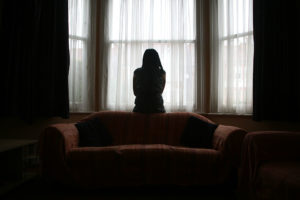This winter is going to be the hardest in living memory. The cost of living has already spiralled so far out of control that poor families are talking about having to choose between eating and heating; just imagine being a woman who currently lives with an abusive man, knowing that her partner will wield the shortage of cash as yet another weapon to bully and humiliate her. Abusers often take complete control of the family finances, meaning their partners, even if they work, are often left without money for essentials such as food and heating. Now, with prices shooting up, the government has been warned that the cost-of-living crisis will have a disproportionate impact on victims of domestic abuse. But ministers don’t appear to be listening.
“It’s crisis upon crisis,” says Dr Shonagh Dillon, CEO of Aurora New Dawn, a charity that provides services for victims of domestic and sexual abuse in Hampshire and the Thames Valley. Organisations like hers have not yet fully recovered from having to deal with the increased demand caused by Covid, and now they are braced for a flood of new calls for help. Back in March 2020, government ministers were warned by MPs, charities and campaigners against domestic violence about the deadly impact lockdown was likely to have on vulnerable women and children. “Stay home” was a bitter message for women who suddenly found themselves shut up, 24 hours a day, with abusive partners. And lo and behold, calls to the national domestic violence helpline rose by 60%, some of them made by concerned neighbours who heard alarming noises from next door.
Dillon recalls the early days of lockdown, when staff trying to deal with a deluge of calls from desperate women had to wait weeks for the government even to designate them as key workers. I tell her about sitting in on remote meetings organised by City Hall in the spring of 2020, as charities and local authorities struggled to respond to the crisis: attempts to set up emergency accommodation to save women from injury and worse were being frustrated by government departments, each of whom — Home Office, Ministry of Justice, Ministry of Housing, Communities and Local Government — claimed it was someone else’s responsibility. Perpetrators fully exploited the situation, telling police officers summoned by a 999 call that they couldn’t enter the family home because someone inside had Covid. They put trackers on phones and cars in case a woman managed to escape on the rare occasions she was allowed to leave the house, to go shopping or take the kids to the park. Social workers moving women to emergency accommodation had to learn how to check for such devices to prevent the victim being followed.
Today it is not lockdown that is being exploited, but the high cost of living. Anxiety about making ends meet is creating ideal conditions for coercive control, a form of abuse that is not as widely understood as physical violence. Of course, the two often co-exist, with a history of financial abuse being revealed only when a victim is being treated for physical injuries. Money problems do not cause abuse but they make it worse, providing extra “leverage” for men who are already threatening and isolating their partners. “My abuser would check accounts when I had the debit card,” one survivor of financial abuse told Women’s Aid. “If I was food shopping, he would ask how much I’ve spent to see if I was truthful as he had already checked online. He would not top up the gas and electric meters so I had to spend all day with no gas or electric.”
Dillon is all too familiar with how coercive control operates. Survivors have told her about men who say: “You’re not feeding your kids. They’ve got holes in their shoes. I’m going to tell social services you’re a bad mother.” That is a terrifying threat to make to a woman who, through no fault of her own, is struggling to put food on the table or having to rely on charity shops to clothe their children. They already feel intense shame about their supposed shortcoming as mothers, something perpetrators understand very well and are eager to exploit. Women fear losing their children above all else — and abusive men can sound very plausible. How can a woman prove she’s not to blame — that money is being kept from her deliberately — when her partner sounds so reasonable to outsiders?
Shortage of money increases the pressures within relationships in other ways, as men who can’t afford to go to the pub or a football match spend more time at home. Researchers used to wonder why intimate partner abuse rises during big sporting occasions, such as the football World Cup, speculating that perpetrators were punishing women when their team lost. The answer turned out to be much simpler: domestic abuse increases whenever men spend more time at home, which is why the big rise during the Covid lockdowns came as no surprise to anyone. There were a spate of domestic homicides — 16 in three weeks — in the first month of lockdown.
Eventually, the government noticed. Covid “acted as an escalator and intensifier of existing abuse”, a joint report from the Home Office, National Police Chiefs’ Council and College of Policing belatedly admits. “It seems to have been weaponised by some abusers as both a new tool of control over victims and… as an excuse for domestic abuse and even homicide.” Two men, Anthony Williams and Hussein Egal, blamed stress caused by Covid when they were charged with killing their wives. Egal inflicted 70 injuries on his wife, Maryan Ismail, after (he claims) she had threatened to throw him out for having the virus. Williams strangled his wife to death, and then pleaded guilty to manslaughter, having told the police that lockdown restrictions had had a negative impact on his mental health. He received a reduced sentence of five years. It remains to be seen whether, in a few months times, men accused of murder will claim they were driven to it by anxiety about not being able to pay the mortgage.
Homicides were not the only deaths linked to domestic abuse: there were also 38 suspected suicides of victims in the first year of the pandemic, a phenomenon so under-researched that we do not have previous years’ figures to compare it with. It attests to the desperate circumstances some women found themselves in, locked in with their abusers, as well as important questions about whether the women’s actions were voluntary.
Surely, surely, ministers would never make the same mistake again? But that appears to be exactly what is happening. “The suicide rate will definitely increase,” Dillon predicts. “It will happen if women can’t flee safely.” She asks herself every day how she can help victims, knowing that her organisation is struggling with its own costs, including soaring heating bills. Some of her employees are single mothers and survivors of abuse, and the cost of living is already hitting them hard. “I’m worried about my staff,” she says. Most earn between £24,000 and £26,000 a year, when they could get more than £30,000 in less stressful occupations. “We are going to lose staff hand over fist. We’re constantly fire-fighting,” Dillon says wearily.
Women’s Aid has addressed the looming crisis in an August report, offering a stark warning: “The cost of living is preventing women from fleeing domestic abuse.” Two-thirds of survivors told the organisation that abusers were using the cost of living increase as a tool for coercive control, “including to justify further restricting their access to money”. Almost three-quarters said that shortage of cash had prevented them from leaving. With private rents beyond the means of most victims, and mortgages prohibitively expensive, women feel trapped. “I feel like my only option to keep my kids is to go back to the marital home where he nearly killed me,” one survivor told the organisation.
Two months ago, a group of charities said they were “disappointed” by the lack of government action on tackling the cost of living crisis. Women’s Aid is calling for mortgage payment holidays for victims, an emergency domestic abuse fund, and discounts on energy bills for organisations that provide services for women and children. Refuge has asked for the £20 universal credit uplift to be restored. The government says it is working across departments to ensure that victims, survivors and their families are fully supported, citing a £230m investment in its Tackling Domestic Abuse Plan.
What the government did not say, however, is just as important. The plan was announced in March, under a different administration, and some of the money is earmarked for long-term projects such as training to recognise abuse. The vast scale of the economic crisis has since become clear, yet one of Liz Truss’s first actions as prime minister was to abolish the role of women’s minister. The decision has been criticised by some Conservative MPs, including the chair of the women and equalities select committee, Caroline Nokes. Having a dedicated women’s minister gives us a voice — and also acts as a brake, forcing government departments to think twice about the impact of policies on women and girls.
If the government is planning a substantive response to a situation many women regard as an emergency, it is keeping very quiet about it. This time round, with so much evidence of the disastrous consequences of its predecessor’s tardy action in lockdown, it has no excuse. Another crisis is playing into abusers’ hands — and there is very little time left to save their victims.
Disclaimer
Some of the posts we share are controversial and we do not necessarily agree with them in the whole extend. Sometimes we agree with the content or part of it but we do not agree with the narration or language. Nevertheless we find them somehow interesting, valuable and/or informative or we share them, because we strongly believe in freedom of speech, free press and journalism. We strongly encourage you to have a critical approach to all the content, do your own research and analysis to build your own opinion.
We would be glad to have your feedback.
Source: UnHerd Read the original article here: https://unherd.com/




